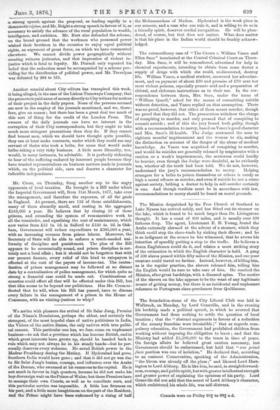The extraordinary case of "The Crown v. William Vance and
Ellen Snee" terminated at the Central Criminal Court on Thurs- day. Mrs. Snee, it will be remembered, advertised for help in chemical experiments, intending to obtain from some doctor a supply of drugs with which she could, undiscovered, destroy life. William Vance, a medical student, answered her advertise- ment, and on payment of about £30 and promise of 2,70 sent her most violent poisons, especially prussic acid and a preparation of chloral, and elaborate instructions as to their use. In, the cor- respondence between them, Mrs. Snee, under the name of "William Quarll," asked for the means of committing suicide without detection, and Vance replied on that assumption. There was no proof, however, that either of them meant murder, though no proof that they did not. The prosecution withdrew the charge of conspiring to murder, and only pressed that of conspiring to commit suicide ; and of this the jury found both guilty, though with a recommendation to mercy, based on Vance's good character and Mrs. Snee's ill-health. The Judge sentenced the man to eighteen months' imprisonment and the woman to six, making the distinction on account of the danger of the abuse of medical knowledge. As Vance was acquitted of conspiring to murder, and would-be suicides are generally released by magistrates with a caution or a week's imprisonment, the sentences could hardly be heavier, even though the Judge were doubtful, as he evidently was, whether all the truth had been told. We do not, however, understand the jury's recommendation to mercy. Helping strangers for a bribe to poison themselves or others is surely as high a moral offence as murder, and even if suicide be not a crime against society, bribing a doctor to help in self-murder certainly is one. And though verdicts must be in accordance with law, recommendations to mercy should be based on moral grounds.






























 Previous page
Previous page